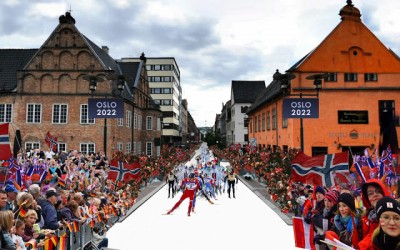NEWS ANALYSIS: Athletics officials, business and tourism groups, city politicians and now state leaders are all launching plans to win public support for a controversial bid to host the Winter Olympics in Oslo in 2022. They’re up against critics who point to the huge expense of an Olympics (called “OL” in Norway), and to the massive budget overruns on earlier city-managed sports facilities.

Leaders of Norway’s numerous athletics organizations themselves have been split over the OL bid, but not because of economic and budget concerns. They’ve criticized the plans for an Olympics presented so far because they want even more new arenas and more events to be held outside the Oslo area. Athletics groups from Akershus, Buskerud and Østfold counties haven’t been happy with the “Games in the City” concept that Oslo officials already have spent millions of kroner drawing up over the past 18 months. Athletics leaders are also arguing for a more elaborate (and even more expensive) OL concept that would “share the wealth” with neighbouring communities.
It’s exactly the uncertainty over how much “wealth” or how many losses will be generated by a so-called “Oslo2022” that’s at issue. Sports bureaucrats meeting over the weekend in Sandefjord were widely expected to keep complaining about a bid they think can be improved, but as newspaper Aftenposten reported Sunday, the critics among them suddenly “fell silent” and a “hallelujah mood” emanated from the podium instead. They apparently decided it was more important to just keep pushing the Olympic bandwagon forward, not least with the City Council poised to vote on exactly that on Wednesday.

Barring any sudden opposition from the conservative Progress Party (Fremskrittspartiet, Frp), which was furious over being out-maneuvered in its opposition to a new Munch Museum last week, the city council was expected to vote on Wednesday to let the application committee for Oslo2022 keep working on Oslo’s OL bid. The next major step will be securing a financial guarantee from the state, which Labour’s Minister of Culture Hadia Tajik has hinted will be forthcoming.
All the pro-OL forces will also need, though, to win support from Oslo residents at a referendum in September, and that’s far from certain despite bullish outlooks from OL backers. The city’s track record on financing huge sports facilities is dubious at best: Bislett Stadium’s reconstruction, for example, ended up costing hundreds of millions more than the public was initially told and adjacent neighbourhood improvements are still unfinished. The budget and construction of the new Holmenkollen Ski Jump turned into a major embarrassment for the city, setting new records for cost- and budget overruns.
That’s why the OL boosters need to mount major campaigns to win public support for their ambitious OL project. They need to convince taxpayers who’ll ultimately face footing at least a NOK 30 billion bill for an Olympics. OL backers both in city government and in opposition on the city council are already joining forces with the sports bureaucrats, tourism and business interests to plot major pro-OL campaigns over the next few months.
Upbeat but unconvincing
At a media briefing for foreign journalists held by the Oslo2022 committee last week, committee director Eli Grimsby gave an optimistic presentation and insisted the committee had “good control” over estimated expenses and budgets. She said the NOK 3 billion budgeted for the construction and re-construction of four arenas for such sports as hockey and speed skating, for example, was “more than enough,” even though Holmenkollen ended up costing more than NOK 2 billion alone, and Bislett cost several hundred million by the time it reopened eight years ago. Grimsby claimed that planning and budgeting for an OL “is different” now and that they’ve “changed the processes” from the days of the budget fiasco around Holmenkollen, yet she couldn’t detail exactly what’s changed.
Grimsby was more keen to talk about how Oslo and Norway have “an obligation” to arrange an Olympics since Norwegian athletes play such a major role in international winter sports. Norway should thus “give something back,” Grimsby suggested.
She also stressed how hosting an Olympics can contribute to the public health in Norway. It wasn’t entirely clear how 14 days of watching OL events either on TV or in person could do that, but Grimsby referred mostly to programs during the run-up to the Olympics that would “promote an active lifestyle.”
OL ‘legacy,’ for better or worse
City officials are also using the Olympics as a means of improving Oslo’s infrastructure and redeveloping several districts such as long-troubled Groruddalen. A 4,000-room Olympic Village and 1,000 Media Center can be re-used as student housing or rental apartments, Grimsby stressed. “We do think we can use the power of the Olympics” for urban redevelopment, she said, speaking warmly of the “legacy” an Olympics can leave in terms of more than just large debts.
The committee’s presentation, marred by language errors in its English materials and Grimsby’s own admittedly halting English delivery, was not entirely convincing in its effort to promote an OL although Grimsby stressed that’s really up to the politicians and sports officials. Her job, along with that of the 12 full-time Oslo2022 staff members already working with her, has been to prepare the city’s application for the Olympic Winter Games and Paralympics in 2022.
Oslo2022 was described in press materials as “a temporary civic agency in the City of Oslo.” If voters turn down the Olympic effort, it will be temporary indeed and cease operations this fall. If voters go along with the project, an application to host the Olympics in 2022 must be delivered to the International Olympic Committee (IOC) by March 14, 2014. The IOC will announce the venue for 2022 on July 31, 2015.
Views and News from Norway/Nina Berglund
Please support our news service. Readers in Norway can use our donor account. Our international readers can click on our “Donate” button:

